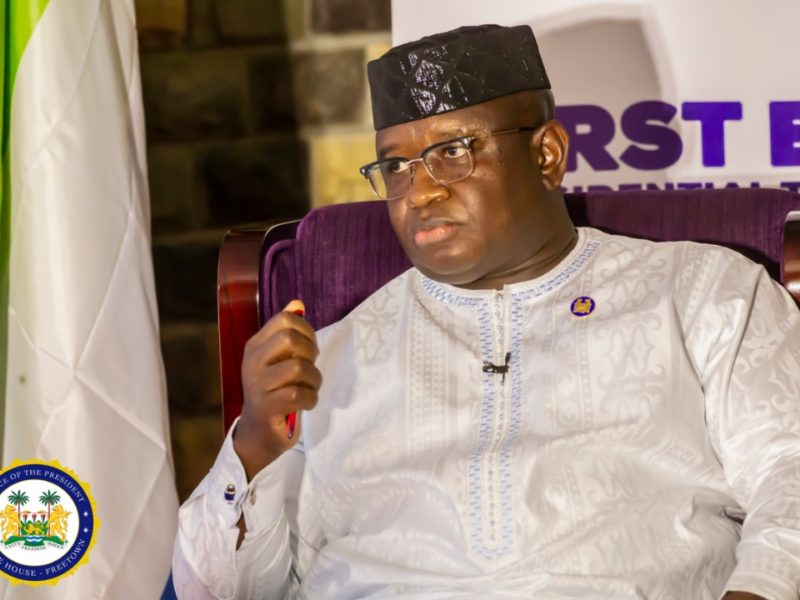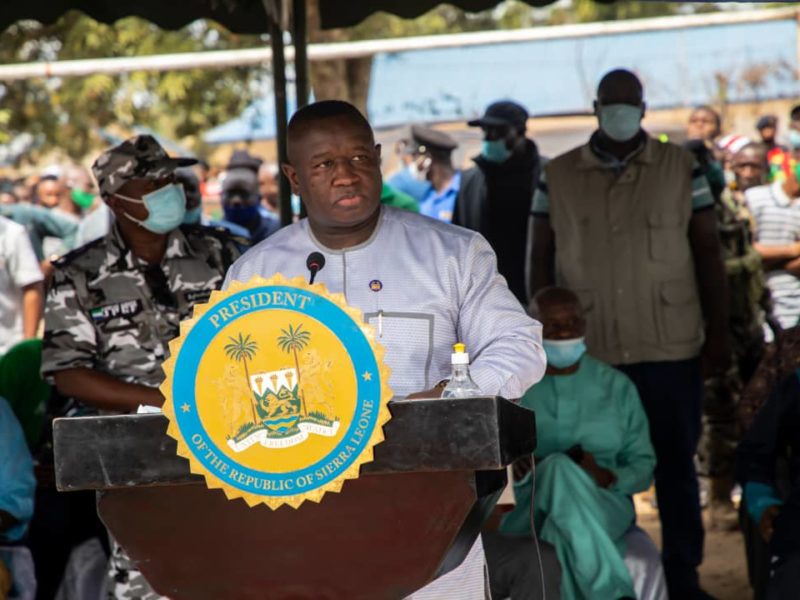Welcoming ‘Steady Progress’ in Sierra Leone,
Peacebuilding Commission Urges Government to Build National Unity Ahead of Crucial November Elections
Foreign Minister Says Government ‘Firmly Committed’ to Peaceful, Credible Polls, as Commission Adopts Second Review of Outcome of 2009 High-Level Session
Commending Sierra Leone for committing to peaceful, free and credible elections, the Peacebuilding Commission today stressed the need for national leadership and sustained international support in managing the root causes of conflict, addressing emerging threats to peace consolidation and establishing conditions conducive to holding the presidential, parliamentary and local council polls, slated for 17 November.
Adopting the Second review of the outcome of the High-level special session of the Peacebuilding Commission on Sierra Leone (document PBC/6/SLE/L.1), the Commission recommended that the Government reinforce efforts to consolidate peace and good governance by: engaging with all national stakeholders in building national unity, ensuring the establishment of an independent police complaints mechanism, continuing to strengthen the multiparty democratic culture, and continuing to support both the National Electoral Commission and the Political Parties Registration Commission.
By other terms of the assessment, political parties and their leaders were urged to recognize their joint responsibility for consolidating peace, and to act in the spirit of the Declaration on the November elections, signed on 18 May by all major stakeholders, and the joint communiqué of April 2009, showing public commitment to peaceful electoral competition. The media was urged to exercise its democratic role in a responsible and impartial manner.
As for international partners, the Commission recommended that they continue to align assistance behind Sierra Leone’s national peacebuilding strategy, the Agenda for Change, support both the Joint Vision for Sierra Leone of the United Nations Family (2009-2012), and the Transitional United Nations Joint Vision (2013-2014), as well as respond to emerging funding needs. Those partners could also consider fielding election observers and supporting the institutionalization of the Anti-Corruption Commission.
For its part, the Commission decided to focus attention on reparations for the elections. Further, it would review the scope of its engagement with Sierra Leone following the completion of the electoral process, in close partnership with the Government and in line with any Security Council-mandated reconfiguration of the United Nations presence on the ground. Members of the Commission’s Sierra Leone configuration committed to advocating on the country’s behalf towards scaling up key peacebuilding initiatives outlined in the second joint progress report on the Agenda.
Joseph Dauda, Sierra Leone’s Minister for Foreign Affairs and International Cooperation, in New York to attend last week’s General Assembly debate, briefed the Commission, saying his Government remained firmly committed to the elections being peaceful, transparent, free, fair and credible. The National Electoral Commission had published a schedule for all stakeholders indicating that the official campaign would begin 15 October. The signing of the Declaration on the 2012 Elections had helped enormously to create a violence-free election atmosphere.
“We hope that this trend will continue throughout the entire process,” he said, thanking the configuration for its support. “We look forward to working with you in moving forward with the peace consolidation process.” The dispute over fees for nominations had been resolved. Candidate nominations were ongoing. In that vein, he emphasized the need to continue investing in success through supporting the Agenda for Prosperity development framework. Discussions should focus on the capacity needs that should be in place by the time the United Nations Integrated Peacebuilding Office in Sierra Leone (UNIPSIL) drew down.
Joining the meeting via video link from Freetown, Samura Kamara, Minister of Finance and Economic Development, said he was proud of the Agenda for Change. Implementing the programme had been challenging and the country had faced monumental tasks, including in the areas of sanitation, health and education. However, the latest analysis, completed with the World Bank, had shown important gains, including a 6 per cent growth rate, due in part to construction projects.
He also noted that over the past four years, advances had been made in public financing, mining and, especially, agriculture, which had been transformed from a subsistence to a commercial level. In addition, access to electricity and clean water had improved in rural areas, and new schools were being built.
With the Government’s focus on effective natural resource management, social protection, good governance and public sector reform, 2013 would be a transition year, he said. In the meantime, a number of thematic studies had been carried out, including an updated poverty profile and labour and employment assessment. While challenges remained in implementing the Agenda for Change, he looked forward to continued cooperation on the Agenda for Prosperity processes.
Also updating the Commission from Freetown,Jens Toyberg-Frandzen, Executive Representative of the Secretary-General, said Sierra Leone was entering a “new era of hope” in terms of its development prospects and democratic transition. Gains made in the infrastructure, health service delivery, energy, agriculture and mineral sectors were significant and should be scaled up. But those gains must translate into concrete dividends: jobs, improved education, and better social service provision, especially for water and electricity. Reaching those goals would require time and resources, and would depend on continued international support.
The prospects for continued progress were within reach, he said, and they would be advanced by the conduct of elections in November. “These elections are exceptionally important for Sierra Leone,” he stressed, reporting that preparations were well underway, with major gains seen in voter registration and ongoing candidate nominations. There had been challenges, but most had been overcome, and in the run-up to the elections, all stakeholders must work to ensure free and fair elections that would be widely accepted by all Sierra Leoneans.
Moreover, he noted that the “Non-State Actors” project, supported by the Peacebuilding Fund, was a key strategy that focused on political parties, religions groups, youth, women, media, academia and others in the electoral process. With discussions ongoing for Sierra Leone’s future development strategy, his office would continue to work with all stakeholders.
When the floor was opened to Commission members, speakers overwhelmingly supported the adopted text and hailed Sierra Leone’s economic, social and political progress made in recent years, underlining the critical importance of the elections for the country’s future and the Commission’s pivotal role. The United Kingdom’s representative echoed a general sentiment, calling the elections “an important milestone” from peacebuilding to a more solid development footing, and hoped that violence that had plagued by-elections over the past two years would not be allowed to be repeated.
Agreeing, the European Union’s representative shared his concerns that reconciliation remained incomplete, while high youth unemployment, extreme poverty and illegal trafficking were among the grave challenges facing the West African nation. “One could not overstress the importance of the upcoming elections as a core benchmark for peace,” he said, noting that political dialogue and confidence building activities were needed to ensure calm and peaceful elections.
Benin’s representative said that what was more important than the elections themselves was what would follow. “We must ensure the elections open up the doors of hope for all Sierra Leone,” she said, highlighting the need to ensure multi-donor funding to support change and development in the country. That included strengthening capacities to deal with illegal fishing, trafficking and other critical areas. But given the current situation, she anticipated that Sierra Leone would become a peacebuilding “success story”.
Egypt’s delegate agreed, calling on all political parties to respect elections results and to cooperate with the Government to show what could be achieved through democracy in Africa. Peaceful elections were extremely important for security and peace in the region, he emphasized.
Recalling that his country had provided pre-election assistance, Australia’s representative heartily supported the electoral process. The United States’ delegate also supported progress made, saying his country viewed Sierra Leone as “an excellent example” of peacebuilding. While welcoming the adoption of the Review, Indonesia’s delegate pointed out that the document did not highlight the importance of South-South cooperation, and asked the ministers to address that issue.
Responding, first to a question on the revenue expected from increased investment in the extractive sector posed by Guillermo Rishchynski, Chair of the Commission’s Sierra Leone configuration, Mr. Kamara said Sierra Leone was working with the International Monetary Fund (IMF) to get a sense of revenue flow from the mineral sector. The budget he had presented to the Commission last year was based on projections for iron ore deposits. Three months into this year, those estimates had been revised downward, due to a price drop and scaled-down production. Estimates would again be revised at the end of 2012, as the constraints lingered.
However, he said that by 2015, when corporate taxation kicked in, Sierra Leone would see increased revenue flows and would work with the IMF to maximize revenues from the extractive industry. Sierra Leone had also learned from other countries that had established sovereign wealth funds. “These are our expectations,” he added.
In closing remarks, Mr. Douda thanked delegations for their constructive interventions on the electoral process. “We have come a long way,” he said, stressing that every Sierra Leonean was determined to show that the investments made in the country would not be wasted. Looking ahead, the Government was exploring possibilities of extending bilateral relationships in hopes that countries would see Sierra Leone as an “investment centre”.
“ Sierra Leone today is a peaceful country,” said Mr. Rishchynski. Democratic institutions were largely in place — but would need to be nurtured — and citizens were increasingly scrutinizing the work of their elected officials. The second joint progress report on the Agenda for Change was a model for how national Governments and partners could come together in a deeply collaborative approach to define priorities. “This is no small feat,” he said . It also was a reminder that Sierra Leone was poised to achieve a transition to prosperity that was centered on elections. “Standing on the shoulders” of the Agenda for Change, Sierra Leone could move on to the Agenda for Prosperity.
On a final note, he said the Commission would visit Sierra Leone from 31 October to 6 November, with the aim of engaging all stakeholders — from political parties, religious leaders and tribal leaders, to Government members and other groups — to underline its expectations for a successful electoral process, as well as its confidence that Sierra Leoneans would seize the opportunity to determine their future.
[ Sierra Leone was placed on the Peacebuilding Commission’s agenda on 23 June 2006, following a referral from the Security Council. To date, the Commission has worked with the Government and international and local partners in priority areas of youth employment and empowerment, justice and security reform, good governance, energy sector development, and capacity building.]
UN Peacebuilding Commission Sierra Leone configuration
Stay with Sierra Express Media, for your trusted place in news!
© 2012, https:. All rights reserved.





